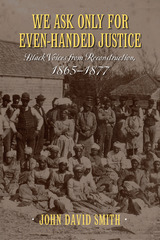

In 1863, General Ulysses S. Grant appointed one of his regimental chaplains, John Eaton of Ohio, as general superintendent of contrabands for the Department of the Tennessee. As the American Civil War raged, the former chaplain’s approach to humanitarian aid and education for the newly freed people marked one of the first attempts to consider how an entire population of formerly enslaved people would be assimilated into and become citizens of the postwar Union. General superintendent Eaton chronicled these pioneering efforts in his 1907 memoir, Grant, Lincoln, and the Freedmen: Reminiscences of the Civil War, a work that for more than a century has been an invaluable primary source for historians of the Civil War era.
In this long-awaited scholarly edition, editors John David Smith and Micheal J. Larson provide a detailed introduction and chapter-by-chapter annotations to highlight the lasting significance of Eaton’s narrative. These robust supplements to the 1907 volume contextualize important events, unpack the complexities of inter-agency relationships during the war and postwar periods, and present Eaton’s view that the military should determine how best to assimilate the freed people into the reunited Union.
Grant, Lincoln, and the Freedmen presents a firsthand account of the challenges Grant, Lincoln, and Eaton himself faced in serving and organizing the integration of the newly freed people. This heavily annotated reprint reminds us just how important Eaton’s recollections remain to the historiography of the emancipation process and the Civil War era.

In 1863, as the Civil War raged, the escaped slave, abolitionist, and novelist William Wells Brown identified two groups most harmful to his race. “The first and most relentless,” he explained, “are those who have done them the greatest injury, by being instrumental in their enslavement and consequent degradation. They delight to descant upon the ‘natural inferiority’ of the blacks, and claim that we were destined only for a servile condition, entitled neither to liberty nor the legitimate pursuit of happiness.”
“The second class,” Brown concluded, “are those who are ignorant of the characteristics of the race, and are the mere echoes of the first.” Four years later, Brown wrote the first military history of African Americans, The Negro in the American Rebellion. This text assailed those whose hatred and ignorance inclined them to keep blacks oppressed after Appomattox.
This critical edition of The Negro in the American Rebellion, one of Brown’s least-analyzed texts, is the first to appear in more than three decades. In his introduction, historian John David Smith identifies the text’s Anglo-American abolitionist roots, sets it in the context of Brown’s other writings, appraises it as military history, analyzes its interpretation of black masculinity and honor, and focuses closely on Brown’s assessment of contemporary racial tensions.
Largely ignored by scholars, The Negro in the American Rebellion, Smith argues, is a powerful transitional text, one that confronted squarely the neo-slavery of the Reconstruction era.
“Whites,” Brown wrote, “appear determined to reduce the blacks to a state of serfdom if they cannot have them as slaves.” His important text was a call to arms in the ongoing race struggle. Smith’s analysis, framed within recent scholarship on slavery, emancipation, and African American participation in the U.S. army, is long overdue.

The years following Appomattox offered the freed people numerous opportunities and challenges. Ex-slaves reconnected with relatives dispersed by the domestic slave trade and the vicissitudes of civil war. They sought their own farms and homesteads, education for their children, and legal protection from whites hostile to their new status. They negotiated labor contracts, established local communities, and, following the 1867 Reconstruction Acts, entered local, state, and national politics.
Though aided by Freedmen's Bureau agents and sympathetic whites, former slaves nevertheless faced daunting odds. Ku Klux Klansmen and others terrorized blacks who asserted themselves, many northerners lost interest in their plight, and federal officials gradually left them to their own resources. As a result, former Confederates regained control of the southern state governments following the 1876 presidential election.
We Ask Only for Even-Handed Justice is a substantially revised and expanded edition of a book originally published under the title Black Voices from Reconstruction, 1865–1877.
READERS
Browse our collection.
PUBLISHERS
See BiblioVault's publisher services.
STUDENT SERVICES
Files for college accessibility offices.
UChicago Accessibility Resources
home | accessibility | search | about | contact us
BiblioVault ® 2001 - 2024
The University of Chicago Press









